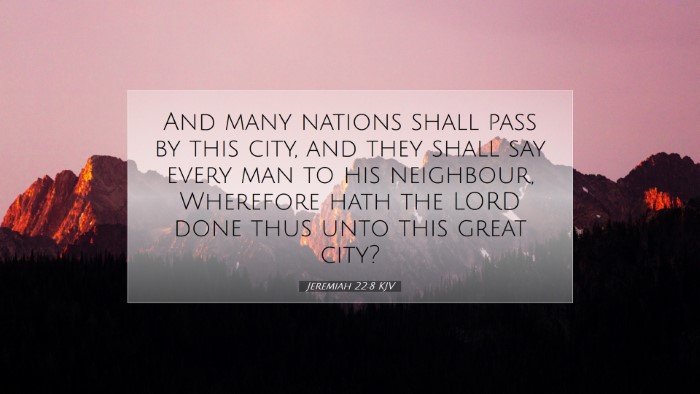Commentary on Jeremiah 22:8
Jeremiah 22:8 states:
"And many nations will pass by this city, and they will say to one another: 'Why has the LORD done such a thing to this great city?'"
Overview
This verse is situated within a broader prophetic context where God, through Jeremiah, addresses the impending doom of Jerusalem due to the unfaithfulness of its leaders and people. It serves as a poignant reminder of the consequences of sin and disobedience against divine commands.
Insights from Commentaries
Matthew Henry
Matthew Henry, a revered biblical commentator, highlights the public spectacle that the fall of Jerusalem will create. He points out that the destruction will not only be a local concern but will also draw the attention of distant nations. Henry elaborates that the inquiry into God's judgment will prompt a significant discourse among the nations, indicating the seriousness and gravity of the situation. He emphasizes the shame connected with Israel's downfall, suggesting that the nations will question the justice of God—“Why has the Lord done such a thing?”—which conveys astonishment and a sense of bewilderment.
Albert Barnes
According to Albert Barnes, this verse can be seen as a foreshadowing of the desolation that will befall Jerusalem, allowing him to connect it with God's covenant relationships with His people. Barnes explains that this verse proclaims a warning; the destruction is a result of Israel’s failure to follow the commands of God. The nations passing by reflect the universal acknowledgement of God's sovereignty and His judgment. They will be beneficiaries of witnessing God’s power and are positioned to learn from Israel's mistakes.
Adam Clarke
Adam Clarke further expounds on the curiosity of the nations as they witness Jerusalem's downfall. He notes that there is a dual aspect of this verse: one of astonishment regarding God's judgment, and another of an opportunity for reflection on righteousness. Clarke posits that the juxtaposition of “great city” with the impending judgment serves as an ironic commentary on spiritual pride versus spiritual poverty. He alerts readers to the fact that divine judgment is not a trivial matter but a significant action that will inspire deep contemplation among all nations concerning the righteousness of the divine character.
Theological Reflections
This verse encapsulates themes of divine justice and human accountability. It serves as a reminder that cities and communities reflecting on God’s blessings must also reckon with the consequences of transgressions. Notably, the reference to many nations passing by presents an image of God's providence extending beyond Israel. It also speaks to the broader implications of sin affecting not just the sinner but the surrounding world.
Consequences of Leadership
As emphasized by previous commentators, leaders in Jerusalem failed to uphold their covenant responsibilities, leading to national disaster. Thus, this passage can serve as a timely admonition for contemporary church leaders and politicians alike to acknowledge the weight of their influence and the potential ripple effect of their actions on the communities they serve.
Universal Lessons
This verse also offers a universal lesson on the nature of sin and its consequences. The inquiry posed by the nations hints at a critical principle—sin carries a cost, not just for the individual but for the collective. This principle remains relevant today as communities face the consequences of collective actions, and therefore, it becomes crucial for theologians and church leaders to underscore the importance of personal and communal integrity in service to God.
Practical Applications for Believers
- Reflection on Accountability: Believers are encouraged to reflect on their personal accountability and the impact of their actions on the community of faith.
- Importance of Righteous Leadership: This passage underscores the call for righteous leadership both in the church and the wider public square, emphasizing the transformative power of godly governance.
- Awareness of God’s Judgment: The universality of God’s justice should inspire vigilance and prompt believers to meditate on their lives and the state of their communities.
- Historical Context and Prophetic Warning: Understanding the historical context of this prophecy can illuminate the recurring nature of human behavior and God's response, encouraging a proactive approach to spiritual integrity.
Conclusion
Jeremiah 22:8 serves as a profound reminder of the complexities of divine justice and human behavior. The commentary provided by Matthew Henry, Albert Barnes, and Adam Clarke emphasizes a multifaceted understanding of the text, encouraging deep reflection for pastors, theologians, and students alike. As we navigate our faith journeys, let this verse inspire us to uphold our covenant with God and lead with integrity, ensuring that our lives and communities reflect God's righteousness.


